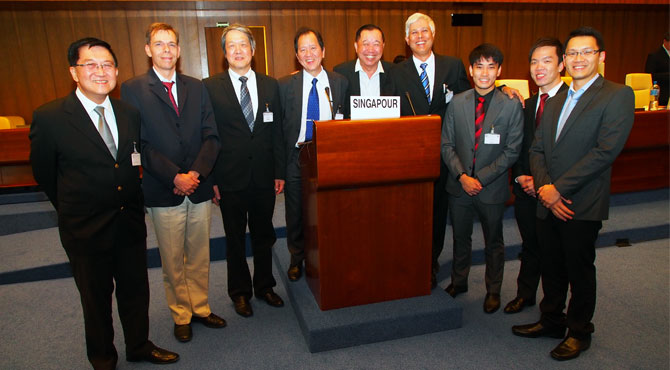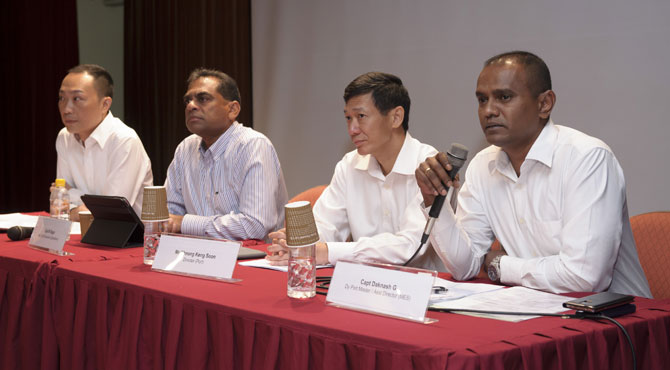Amendments to the Code of the Maritime Labour Convention (MLC)
The Maritime Labour Convention (MLC) had only recently entered into force on 20 Aug 2013 and already efforts to improve on it had been set in motion. At the 103rd session of the International Labour Convention (ILC) held in May and June 2014, two sets of amendments to MLC were adopted. The amendments are expected to enter into force 2.5 years later. The MLC amendments are related to financial security covering the abandonment of seafarers and compensation for the death or long-term disability of seafarers due to occupational injury, illness or hazard.
Although all Singapore ships are already required to be covered by financial security as part of MLC compliance, slight changes regarding how shipowners obtain financial security to cover the seafarers on their ship will be expected. Flag Administrations including MPA will be required to determine and specify the form of financial security that is acceptable to assure seafarers protection in those above circumstances. Shipowners will also be required to display documentary evidence of the financial security on board ships, in order for seafarers to easily access the information.
Updates on the types of financial security that are acceptable by Singapore will be announced closer to the date of entry into force of the amendments. We understand that the current practice of the majority of shipowners is to obtain such financial security by purchasing coverage from the P&I clubs. The insurer members of the International Group of P&I Clubs have also been involved in the discussions at the International Labour Organisation (ILO), and they are expected to adjust their issuance of cover to meet the new requirements under the amendments. Nonetheless, as the amendments now lay out more specifics on the scope of coverage, we encourage shipowners to plan ahead and assess if there is any need to revise the terms of their existing financial security arrangements.
The amendments build on existing MLC requirements and provide greater clarity on what the financial security should cover to benefit seafarers. The amendments also lay out the specific conditions under which financial security would be triggered. Seafarers will thus be provided with the certainty of a safety net in times when a shipowner cannot meet obligations under the MLC such as payment of wages or repatriation. In addition, the amendments also elaborate on the specific claims that a seafarer is entitled to make, in relation to compensation arising from occupational injury, illness or hazard.
Prior to approval at the ILC, the amendments were discussed at the first meeting of the Special Tripartite Committee (STC) held from 7 to 11 April 2014. Singapore was represented by a delegation of tripartite partners which included the MPA, Singapore Shipping Association (SSA), Singapore Maritime Officers’ Union (SMOU) and Singapore Organisation of Seamen (SOS). Our active participation in suggesting features that are effective and balanced to address practical implementation issues received much support from other delegations and was recognised at the STC.

MPA will continue to work with our partners in the tripartite working group to ensure a smooth implementation of the amendments. We will continue to provide updates to the shipping community via circulars and other means.
Findings of Safety Review Committee
Following the three collisions resulting in oil spills which took place early this year, the MPA formed a Safety Review Committee (SRC) to holistically review these incidents to uncover contributory human and non-human factors, examine MPA systems and procedures, and make recommendations to correct any systemic gaps with the aim to prevent recurrences.

Key Findings
The findings showed that human error and poor judgement of the situation were the main causal factors.
There was lack of situational awareness of the bridge teams including the pilots, even though the Port Operations Control Centre had provided advisories and warnings of the traffic situation to them. The bridge teams also did not make full use of the Automatic Radar Plotting Aid and Electronic Chart Display and Information System to assess the situation.
The SRC also reviewed the overall regime of navigational safety in the Port of Singapore (PoS). The SRC found no significant increase in the number of incidents between 2007 and 2013, nor was there apparent correlation in the occurrence of incidents and growth in vessel movements.
Key Follow Ups
Notwithstanding, the SRC recommended the following key measures to further enhance the safety of navigation in the PoS and Singapore Strait:
-
Instil a strong safety culture
MPA should work with the industry to develop an integrated safety management framework to promote a strong culture of safety awareness, including the conduct of regular safety briefings to the shipping community. Enhance communication and information sharing
PSA Marine should enhance the information sharing between pilots and ship masters, including timely dissemination of passage plan to the ships. There should also be procedures for its pilots to follow when communication failure occurs between the pilots on converging ships or between MPA Vessel Traffic Information System (VTIS) and their ships.Improve safe passage in high risk areas
MPA VTIS should consider providing more active advisories to vessels navigating at high traffic density areas in the PoS and Singapore Strait. MPA should also work with the shipping community to ensure ship masters are present on the bridge when their ships are transiting critical areas in the Singapore Strait.
To implement the above measures and ensure efforts are sustained, MPA will form two working groups:
The MPA-PSA Marine Safety of Navigation Working Group.
The MPA-SSA (Singapore Shipping Association) Safety of Navigation Working Group.
MPA will be launching a Safety Campaign to raise the level of awareness of navigational safety in the shipping community.
